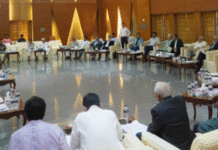Lawmaker Aslamul filled up over 54 acres of Buriganga, wetland for power plant, pvt economic zone, govt probe finds

A ruling party MP has filled up more than 54 acres from the Buriganga river and wetland to construct a power plant and a private economic zone in Basila, according to a government probe report.
Aslamul Haque, lawmaker of Dhaka-14, started this illegal activity in 2010, found the probe led by the National River Conservation Commission (NRCC).
The report recommended the land be recovered and restored to its original state as nearly 14km of the river is dying due to this earth filling.
Out of that 54 acres, at least 12.78 acres was part of the Buriganga, according to the oldest land record available, known as the Cadastral Survey (CS) record map. This survey ended in 1940.
This river land was illegally recorded as a private property in the Revisional Survey, which ended in 1962, says the NRCC report.
The lawmaker filled up the wetland illegally and constructed a power plant and factories there, creating obstacles to the water flow, which is a clear violation of the Water Act, the probe found.
NRCC prepared the report in line with the 2009 High Court verdict that directed the government to measure the river areas based on the CS record.
Aslamul Haque filed a writ petition to the HC on September 2 this year after Bangladesh Inland Water Transport Authority (BIWTA) on August 23 asked him to remove within seven days the structures built for his power plan and Arisha Private Economic Zone in the area.
The lawmaker also submitted an application to the BIWTA to conduct a survey to find out whether any of this land was part of the river.
Following his petition, the NRCC formed a probe committee involving all government offices concerned, including that of Dhaka deputy commissioner, joint director of BIWTA, director general of Land Record and Survey Directorate, director general of Bangladesh Water Development Board, chairman of Bangladesh Economic Zone Authority (BEZA), AC land (Keraniganj circle), AC land (Savar circle) and chairman of Rajdhani Unnayan Kartripakkha (Rajuk).
After conducting manual survey and using remote sensing technology with the help of Space Research and Remote Sensing Organisation (SPARSO), the commission found the actual area of land being filled up in the area was 54.01 acres, two acres more than what the MP had mentioned in the petition.

The NRCC report also states Aslamul Haque in 2016 submitted a plan to BEZA authorities to set up the economic zone on 84 acres of land.
“We have recommended investigating how he would obtain the rest 30 acres,” Dr Mujibur Rahman Howlader, chairman of the NRCC, told The Daily Star on Sunday.
He said they have also requested the Land Record and Survey Directorate to investigate how a portion of the river was recorded as private land during the RS survey.
The commission last week submitted the 20-page probe report to the authorities concerned, including the BIWTA, requesting them to remove all structures and earth from the filled-up land and restore it to its original state.
Earlier, The Daily Star obtained satellite images taken in 2008 clearly showing the land along the Basila bridge being part of the Buriganga river.
Multiple satellite images taken in 2011 and 2015 show how the riverbed was filled up over the years during which Aslamul Haque constructed structures for the power plant and economic zone.
In 2008, when Aslamul Haque submitted his wealth statement to the Election Commission to contest for Dhaka-14, he declared a total of 615 decimals (around six acres) of land on the outskirts of the capital.
Ahead of the next general election in 2014, his wealth statement mentioned more than 14,178 decimals (more than 141 acres) of land, the location of which was not disclosed.
The question remains how he got the additional land.

In a press conference on Saturday, he rejected the probe report and said he started purchasing “private land” from different “original owners” in 2010 for Maisha Power Plant and Arisha Private Economic Zone in Oayeshpur and Ghatarchar mouzas in Keraniganj and Hazratpur mouza in Savar.
Reading out a written statement, he termed the NRCC chairman a follower of Ziaur Rahman and Ershad and said he would fight a legal battle for his land.
Talking to The Daily Star yesterday, he said the river commission report has not been prepared following due procedures. “If this land is part of the river, the authorities can take it back but there has to be a proper survey for this.”
He again claimed that he had bought this land from original owners.
Asked about apparent discrepancy over the declared land in the two wealth statements, he said, “I cleared it all in 2014 by submitting necessary papers to the Anti-Corruption Commission.”
Earlier on March 12 this year, asked about these allegations, Aslamul Haque denied any wrongdoing and claimed the land was not part of the river and it was recorded as “null” [non-arable] in the RS survey record conducted between 1956 and 1962.
He claimed the BIWTA authorities gave him clearance twice — in 2011 and 2015 — “but they are now raising their objections”.
However, the then BIWTA joint director AKM Arif Uddin, who has been recently transferred, said they only gave him the permission to use a floating jetty.
A 2009 landmark High Court judgment detailed measures to recover ailing rivers from land grabbers and save them from pollution.
Yet influential people grabbed river foreshores as government officials did not perform their duty properly, said Sharif Jamil, general secretary of Bangladesh Paribesh Andolon (Bapa) and country representative of International Riverkeeper.
Though the HC announced these rivers to be living entities entitled to all the legal rights and directed the government to protect them, the authorities have so far failed to implement the court directives, he added.
“We demand proper demarcation of rivers.”
Syeda Rizwana Hasan, chief executive of Bangladesh Environment Lawyers Association, said the impact of the High Court judgement will only be felt when the NRCC coordinates and monitors the actions of other agencies involved.









